|
|
|
Sort Order |
|
|
|
Items / Page
|
|
|
|
|
|
|
| Srl | Item |
| 1 |
ID:
192196
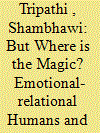

|
|
|
|
|
| Summary/Abstract |
The affective turn in International Relations (IR) has been engaged in the critical project of returning the emotional to the international for a while now. Following these efforts to reinvest humanity in politics, this article seeks to investigate if an engagement with emotional humans can provide refuge from, grapple with and ultimately transform a disenchanted world of IR and spell new worlds into existence that place the emotional-relational at the centre of its practice. Drawing on feminist, aesthetic and decolonial scholarship on emotional-relational humans, I argue that such imaginations can open routes to recovery for emotional worlds in the discipline. I introduce magical realist fiction as a genre of literary writing which embraces the magical ability of humans who resist and transform unbearably rational worlds through their emotional relations with each other. Gleaning moments of emotional incantations by humans–in Isabel Allende’s A Long Petal of the Sea, Salman Rushdie’s Midnight’s Children, and Gabriel Garcia Marquez’s Love in the Time of Cholera–which work to transform a world that becomes too difficult to bear for its inhabitants, I contend that IR stands to gain invaluable lessons by immersing itself in the kind of emotional magic that such literature and its resident humans spell into being.
|
|
|
|
|
|
|
|
|
|
|
|
|
|
|
|
| 2 |
ID:
192202
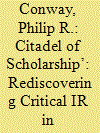

|
|
|
|
|
| Summary/Abstract |
‘Critical’ international relations (IR) is usually understood to have originated in the early 1980s. However, a close reading of Vithal Rajan’s ‘An Epitaph for Detached Scholarship’, published in the inaugural issue of Millennium in 1971, tells another story. Rajan’s article was not a work of critical theory per se, but it was in tune with demands, at this time, for establishing a ‘critical university’. Promising to open up university education to all, dispensing with traditional curricula and authoritarian modes of teaching, the critical university, like Rajan’s article, has long since been forgotten. Nevertheless, this moment set the scene for the professionalised establishment of ‘critical’ academia in the decades to come. Rediscovering Rajan’s ‘Epitaph’ thus offers to reconnect critical IR with an earlier, and perhaps more generative, moment of inception. Indeed, even today, Rajan’s creative, provocative, playful text stands out as a rewardingly undisciplined contribution to the discipline.
|
|
|
|
|
|
|
|
|
|
|
|
|
|
|
|
| 3 |
ID:
192190
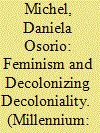

|
|
|
|
|
| Summary/Abstract |
This article demonstrates the import of feminist reflexivity for the decolonial project. At its best, the decolonial project reveals the form and extent to which contemporary ideas and power structures are imbued with generations of power structures whose foundations were laid during colonialism. However, some power dynamics can be lost in reified forms of decolonial critique. Feminist methodologies, especially reflexivity, remind us to revisit the particulars of the constructions of power within dominant power structures and, as importantly, within resistant power structures. We revisit the decolonial stance within an Indigenous cosmology, Aymaridad, ‘the’ Aymara worldview as constructed for the second largest Indigenous population in Bolivia. Aymaridad is an important site for feminists to revisit the relationship between feminism and decoloniality because over a decade ago, María Lugones charted a course for decolonial feminism that drew on an Aymaran approach to decolonizing gender. By revisiting the coloniality embedded in the construction of Aymara (in academe and in politics), we reveal that feminism’s persistent reflexive methodology, even more than its attention to gender specifically, makes it an essential part of the decolonial theory.
|
|
|
|
|
|
|
|
|
|
|
|
|
|
|
|
| 4 |
ID:
192191
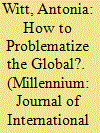

|
|
|
|
|
| Summary/Abstract |
International Relations (IR) has long been criticized for taking a particular (Western) experience as basis for formulating theories with claim to universal validity. In response, recent discussions have therefore centered on making IR ‘truly global’, that is, more inclusive and less parochial in its language and substance. But the concept of the global underpinning this discussion is both illusive and strongly contested. It requires problematization. But how? In this Forum, scholars discuss this question with a forward-looking agenda. Building on recent critical engagements with the question of the global as a concept in general and Global IR specifically, the authors ask how the global should be problematized in order to achieve a (more) progressive agenda for IR. They draw on different regional and disciplinary perspectives to both further the agenda of a less exclusive and racist discipline without falling into the trap of shallow inclusivity, and to discuss ways of problematizing the global without falling back into nativism or nationalism.
|
|
|
|
|
|
|
|
|
|
|
|
|
|
|
|
| 5 |
ID:
192195
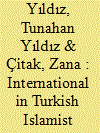

|
|
|
|
|
| Summary/Abstract |
This study examines Islamist understanding of change in the international system by inquiring into the conception of the international in Turkish Islamist tradition. It relies on a discourse analysis of Islamist journals’ entire corpus in Turkey from the 1940s to the 2010s. Its founding premise is that the Islamist prescription of change in the international system revolves around the notion of Pan-Islamism. This study first builds on an examination of the five ideological grounds of Pan-Islamism: dogmatic, historical, conjunctural, pragmatic/practical, and emancipatory. It further discusses the embodiment of Pan-Islamism at its two ends: pluralist/thin and monist/thick visions of Pan-Islamism. The analysis brings forth four main findings: First, notwithstanding its persistent claims to authenticity, the Pan-Islamist proposal is a synthetic conception of the international, combining authentic concepts, e.g. the umma, with such conventional concepts as balance of power, understood primarily in terms of alliances and blocs. Second, it does not purport to a significant questioning of the ordering principles of international relations, notably sovereignty and territoriality. Third, the Pan-Islamist proposal is, for the most part, power- and hegemony-oriented, amid its overinflated normative baggage and self-proclaimed anti-imperialism. Fourth, it mainly offers a change in the international rather than a change of the international, therefore discrediting any emancipatory potential it has claimed.
|
|
|
|
|
|
|
|
|
|
|
|
|
|
|
|
| 6 |
ID:
192204
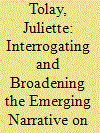

|
|
|
|
|
| Summary/Abstract |
As a promising field of inquiry to understand the nexus between migration and foreign policy, migration diplomacy is rich with studies focusing on the agency of countries in the global South, highlighting the effect of power asymmetries, as well as the existence of a wide range of migration diplomacy practices. This article proposes to take these important contributions even further by opening the field to a wider range of theoretical and epistemological approaches. In particular, this analysis highlights the ahistorical nature and eurocentrism of the field and the extent to which it is based on an unrooted conception of power asymmetries. It also calls for a stronger critique of the field’s focus on material interests, as well as the implicit prioritization of states’ interests. The article encourages further research based on the historical colonial/imperial positionality of different actors to highlight both past and current, visible and invisible practices of migration diplomacy.
|
|
|
|
|
|
|
|
|
|
|
|
|
|
|
|
| 7 |
ID:
192197
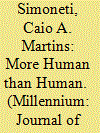

|
|
|
|
|
| Summary/Abstract |
Science fiction has often been associated with colonial imaginaries, given its engagement with themes such as invasions and encounters with other civilisations. This article addresses these relations by focusing on the invasion plot subgenre and the nexus between the modern subject and colonial frameworks. It argues that conceptions of subjectivity are a site of symbolic struggle, acting not only as the bases of the reproduction of colonial logics in these narratives, but also as a locus for their disruption. It first analyses Independence Day and War of the Worlds, highlighting how categories such as disembodiment, anthropocentrism and linear progress are crucial in reproducing the modern subject and colonial hierarchies in invasion stories. It then explores Arrival and Annihilation to argue that invasion plots can also present alternative forms of encounter as they disrupt modern subjectivity and colonial frameworks by contesting ideas of disembodiment, identity, progress and the human/nonhuman divide.
|
|
|
|
|
|
|
|
|
|
|
|
|
|
|
|
| 8 |
ID:
192198


|
|
|
|
|
| Summary/Abstract |
The article attempts to empirically identify how the concept of Indigenous refusal helps us understand growing Palestinian political discourse and practices. It aims to develop Critical Indigenous Studies’ potentialities vis à vis the study of historic Palestine. The article puts a particular emphasis on new visions of Palestinian resistance that take aim at the different ways the Global North has tried to impose specific models and narratives on the Palestinian cause through liberal politics of recognition. Those spatio-political arrangements are enmeshed in the so-called ‘Oslo paradigm’ but also concern the portrayal of Israel as a liberal multicultural society, as well as the neoliberal dynamics that continuously shape the different fragments of the Palestinian people. In this regard, Indigenous Palestinian refusal also presents an international dimension that has progressively led to the articulation of anti-racist, anti-imperialist, and anti-capitalist imaginaries that would contribute to shaping radical Palestinian – and transnational – futures.
|
|
|
|
|
|
|
|
|
|
|
|
|
|
|
|
| 9 |
ID:
192192
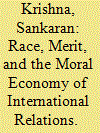

|
|
|
|
|
| Summary/Abstract |
International Relations (IR) as a discipline explains the fact of global inequality through a discourse of meritocracy. In the early decades of the discipline, such explanations were explicitly racial, and justified empire and Western dominance on the basis of their innate superiority over the rest of the world. In later and in contemporary times, such racialized explanations for inequality have been replaced by ostensibly merit-based explanations that turn out, on closer examination, to replicate the inner logic and exclusionary claims of earlier ones. The notion of meritocracy has been a key element in the ideological appeal of IR as a discourse to elites and aspiring middle classes central to nation-building efforts in the global South. This latter fact complicates efforts that equate decolonizing the discipline with the promotion of diversity in its membership and the widening of its empirical and theoretical concerns. Central to any notion of a genuinely decolonial IR must be an attack on the very idea of merit as explaining and justifying international and domestic inequality.
|
|
|
|
|
|
|
|
|
|
|
|
|
|
|
|
| 10 |
ID:
192193


|
|
|
|
|
| Summary/Abstract |
Ever since Ladakh separated from the erstwhile Indian state of Jammu and Kashmir and became the youngest Indian Union Territory in August 2019, there is a lingering ambiguity about what it means for its people. This poem – Red Soil – is an expression of feelings of insecurity faced by the people of Ladakh, especially its youth, as an alternative expression of marginalized voices as resistance to statist voices. Ever since the 1800s, Ladakh has been subject to colonization, when it was first captured by the Dogra Dynasty. Contextualizing Ladakh’s past, the poem is titled, Red Soil, which is the English translation of the ancient name of Ladakh – Maryul (Mar means red and Yul means a country in Bhoti/Ladakhi/Tibetan language). This poem, first presented at Millennium’s 2021 conference, is also a response to calls to subvert traditional styles of academic writing within critical international relations and is situated in the autoethnographic method (Brigg and Bleiker 2010).
|
|
|
|
|
|
|
|
|
|
|
|
|
|
|
|
| 11 |
ID:
192200
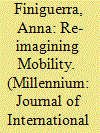

|
|
|
|
|
| Summary/Abstract |
(In)visibility is a central concept in debates on mobility and migration. It has been perceived as both resource and obstacle to transformative political practices. The aim of this article is to unpack how events tied to migration have been labelled simultaneously visible and invisible. This is not merely a contradiction but a sign of how knowledge about migration is produced in complex, multiple and contrasting ways. To assess these processes, however, scholars cannot rely on the language of (in)visibility as it comes short in articulating both the situatedness of processes of knowledge production and their multiplicity. This article proposes the language of ‘making present’ as an alternative, which enables us to track how different (in)visibilities have diverse political consequences. The conceptual contribution of the article is fleshed out by analysing two empirical cases: the construction of the Gateway to Europe and instances of migrant self-narration on the same site.
|
|
|
|
|
|
|
|
|
|
|
|
|
|
|
|
| 12 |
ID:
192194


|
|
|
|
|
| Summary/Abstract |
This article explores the entanglements of settler colonialism with the integration of the 20th century-built environment onto the UNESCO World Heritage List by focusing on architectural preservation in Brasilia. The addition of Brasilia to the World Heritage List in 1987 was the realisation of a longstanding effort to enhance institutional legitimacy by expanding the representation of 20th century sites in geographies from the Global South. However, I argue that the addition of the pilot plan as Brasilia implicated both the World Heritage Committee and purveyors of Brasilia’s significance to architectural history in circumscribing the pilot plan from surrounding urban fabric. This argument is advanced by drawing on settler colonial studies, architectural history, architectural preservation, histories of Brasilia, and meeting notes from the World Heritage Committee. The article concludes that the preservation of the pilot plan as Brasilia 1) legitimates of spatial fragmentation in Brasilia through architectural history, 2) shows how settler colonialism is constitutive of the legitimacy of the World Heritage List, and 3) illustrates how international organisations have the potential to serve as vehicles for the reproduction of the logic elimination and the consolidation of settler spatial control.
|
|
|
|
|
|
|
|
|
|
|
|
|
|
|
|
| 13 |
ID:
192201
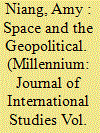

|
|
|
|
|
| Summary/Abstract |
The paper argues that the dominant geopolitical analysis draws from a tradition of thought that privileges a geographical approach to space. The process that extends such impetus most compellingly can be found in security intervention. Interventionism, specifically under the War on Terrorism (WoT) thinking projects a cartography of (in)security and threat that disrupts on the one hand existing dynamics of space production and on another redefines space as geography with violent consequences for a variety of life-forms. The question that guides my endeavor is the following: how does a rethinking of the geographical question in international relations (IR), particularly with regards to intervention and the WoT enable us to expand an understanding of geopolitics beyond power struggles over space? Thinking from the Sahel-Sahara region, I wish to offer an alternative view of space where life, government, intellectual representations, commerce, culture, landscape, and belief lead to different kinds of relationships. This view is meant to suggest the beginning of the sketching of different systems of thought and morals through which to apprehend more productively a notion of space in IR.
|
|
|
|
|
|
|
|
|
|
|
|
|
|
|
|
| 14 |
ID:
192199
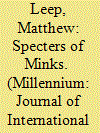

|
|
|
|
|
| Summary/Abstract |
While narrative approaches in International Relations (IR) have become increasingly prominent, posthumanist narratives of capitalism remain on the margins. Informed by feminist avant-garde poet Susan Howe and philosopher Jacques Derrida, I develop a ‘drift narrative’ approach to human-mink relations during the SARS-CoV-2 pandemic, wherein millions of minks in fur farms were infected by the coronavirus and culled. This approach employs the use of postcapitalist elegies constructed in a wildlife refuge located near a mink factory farm. In a context of global mink culls, the wildlife refuge – where minks live freely – proximate to a local industrial mink fur farm – where minks are caged and killed for profit – became the site of (re)writing IR in drift narrative form. This poetic analysis highlights trans-spatial links of animal capital and employs intermixed elegiac images, sound recordings, and textual fragments to help us become attuned to nonhuman dreams, desires, losses, and futures. Grounding persistence for postcapitalist futures within the dreams of the dead, the drift narrative generates a spectral form of global multispecies solidarity. Contributing to the interspecies and narrative turns in IR, as well as multidisciplinary work on multispecies solidarity, the drift narrative offers an aesthetic and ethical critique of past and future animal capital systems that render more-than-human life as killable.
|
|
|
|
|
|
|
|
|
|
|
|
|
|
|
|
| 15 |
ID:
192203
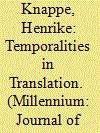

|
|
|
|
|
| Summary/Abstract |
Within the Sustainable Development Goals (SDGs) process, different futures are contested, negotiated and become embedded in the Anthropocene. Those futures travel from one city to another, from businesses to local schools, or from protest events to the international negotiation fora of the United Nation (UN). By investigating the translation practices of Anthropocene futures from the global context of the UN into the local context of the city of Baltimore (United States), this paper traces how local actors engage with global norms and how they gain or lose agency in this process. Putting forward imaginaries of past, present and futures are practices of norm translation and appropriation that clearly change the once envisioned global future narratives. The paper brings together the Anthropocene scholarship with the International Relations-literature on translation. I suggest a new conceptual approach of translation that includes notions of ruptures, discontinuities and present pasts as main factors in translation processes. I apply this new framework to the case of SDG localization in Baltimore. In doing so, I analyse three major reports and 10 qualitative interviews that I conducted with local actors from the university, the city administration as well as different civil society actors in 2018. Here, I will discuss the different temporal notions, more specifically the way futures and pasts intersect in non-linear processes of translation.
|
|
|
|
|
|
|
|
|
|
|
|
|
|
|
|
|
|
|
|
|